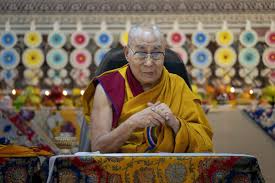Successor to 14th Dalai Lama can be chosen only by established conventions: India

New Delhi, July 3, 2025 — India has firmly reiterated that the next Dalai Lama must be chosen through centuries-old Tibetan Buddhist traditions. This declaration comes amid global concern over China’s attempts to control the religious succession.
During a weekly media briefing, Ministry of External Affairs spokesperson Randhir Jaiswal made India’s position crystal clear. “The selection of the next Dalai Lama is a religious matter. It must follow established traditions and cannot be subject to external interference,” he said.
Although no specific country was mentioned, the context of the statement clearly points toward China. The Chinese government continues to assert that it will decide the successor, a stance widely criticized by the international community.
A Subtle Yet Clear Message to Beijing
Without directly naming China, India has delivered a pointed message. For years, Beijing has claimed authority over the selection of the next Dalai Lama. Its officials argue that the reincarnation process must comply with state-approved procedures.
However, India’s emphasis on tradition sends a different signal. It suggests that matters of faith should be handled by religious communities — not political regimes. According to Prof. Tenzin Norbu, a Dharamshala-based Tibetan analyst, “India’s statement affirms the spiritual independence of Tibetan Buddhism. It’s a diplomatic yet powerful rebuke to authoritarian interference.”
The Dalai Lama’s Reincarnation: A Global Concern
At 89, the 14th Dalai Lama remains the spiritual heart of Tibetan Buddhism. After fleeing to India in 1959 during a failed uprising in Tibet, he has lived in exile in Dharamshala, where the Tibetan government-in-exile is also based.
Over time, he has spoken openly about his reincarnation. In fact, he has stated that he might not reincarnate at all — or that his rebirth could occur outside Chinese territory. These remarks directly challenge China’s control narrative and raise the stakes in the global debate.
Furthermore, the Dalai Lama has insisted that only senior Tibetan Buddhist monks can identify his successor. No political body, including China’s Communist Party, should interfere in this deeply spiritual decision.
China’s Track Record Raises Red Flags
China’s approach to religious succession has drawn intense criticism. In 2007, it passed a law requiring all reincarnated Tibetan spiritual figures — or “living Buddhas” — to obtain government approval. Critics view this move as an attempt to turn spiritual leadership into a tool for state control.
A prime example of this interference occurred in 1995. The Dalai Lama identified Gedhun Choekyi Nyima as the 11th Panchen Lama, the second-highest figure in Tibetan Buddhism. Just days later, Chinese authorities detained the boy and installed their own candidate. Gedhun Choekyi Nyima has not been seen publicly since.
These actions have prompted fears that China will eventually install a puppet Dalai Lama — one aligned with its political goals, not spiritual integrity. As a result, many Tibetans worry about the future of their faith.
India’s Support for Tibet: A Strategic Choice
Though India officially recognizes Tibet as part of China, it has long supported the Tibetan cause in practice. For over six decades, India has hosted the Dalai Lama and over 100,000 Tibetan refugees. The presence of the Tibetan government-in-exile in Dharamshala further reflects India’s role as a sanctuary for religious and cultural freedom.
In recent years, the India-China relationship has been tense, especially following border clashes in Ladakh. Against this backdrop, India’s open support for Tibetan traditions takes on added significance. It allows New Delhi to uphold democratic values while subtly countering Beijing’s influence.
Moreover, this stance aligns India with the international community. Many democratic nations believe the Dalai Lama’s reincarnation must remain a religious process, free from state control.
International Backing for Religious Autonomy
India is not alone in its concerns. The United States, for example, passed the Tibetan Policy and Support Act in 2020. This law affirms that only Tibetan Buddhists have the right to choose the Dalai Lama’s successor. It also threatens sanctions against Chinese officials who interfere with the process.
Other nations, including Germany, Japan, and Canada, have voiced similar views. They stress the importance of keeping politics out of spiritual leadership. In doing so, these countries uphold the broader principle of religious freedom.
Former Tibetan leader Lobsang Sangay put it best: “This is not about one man or one religion. It’s about defending humanity’s right to believe freely and without fear.”
What the Future Holds
As the 14th Dalai Lama grows older, the succession debate is only gaining urgency. What was once a matter of faith has now become a geopolitical flashpoint. For Tibetans, the next Dalai Lama represents continuity, culture, and hope. For China, the position offers a means to solidify control over the region.
India’s statement reinforces that spiritual matters must not be dictated by political agendas. In doing so, it sends a message to both Tibetans and the world — tradition matters, and it must be protected.
The coming years will be critical. How the world responds to China’s actions will shape not just Tibetan Buddhism, but the broader fight for religious freedom in authoritarian regimes.






